Unilever Plc: Research Project on Managing Cultural Diversity
VerifiedAdded on 2023/01/16
|23
|4770
|88
Project
AI Summary
This research project analyzes the need for effective cultural diversity management to enhance organizational operations, using Unilever Plc as a case study. The project begins with an introduction, outlining the research aim to analyze the need for managing cultural diversity, and the objectives including understanding the concept of cultural diversity, identifying the need for management, determining the impact of managing diversity, and identifying effective measures. The literature review explores the concept of cultural diversity and its benefits, the need for managing it within Unilever Plc, and the positive and negative impacts. The methodology section details the deductive research approach, quantitative research method, sampling techniques, data analysis using thematic analysis, and ethical considerations. Data collection involves both primary and secondary sources, with a focus on questionnaire-based primary data. The questionnaire assesses employees' understanding of cultural diversity and its impact. The project concludes with an analysis of the findings and recommendations for effective diversity management strategies.
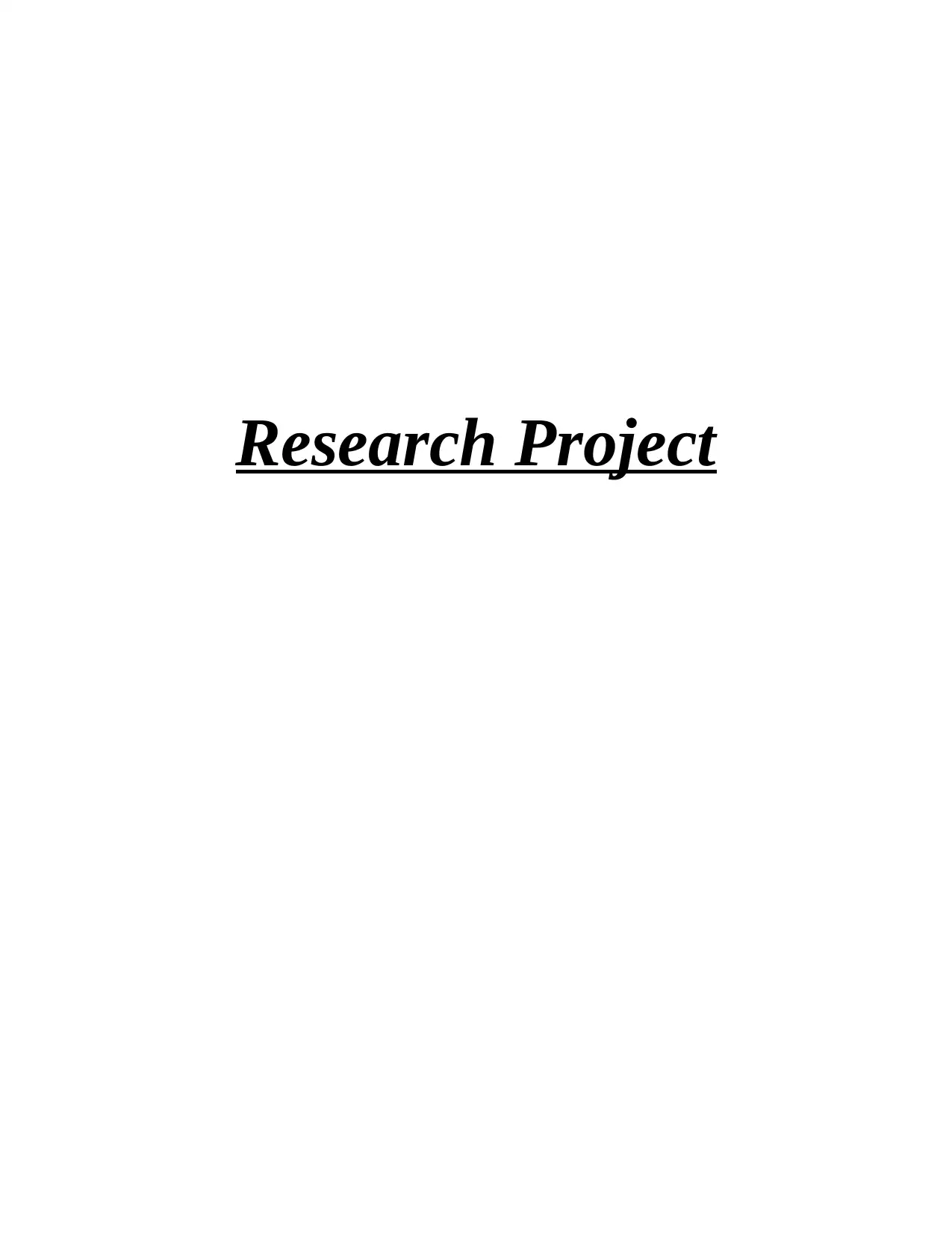
Research Project
Paraphrase This Document
Need a fresh take? Get an instant paraphrase of this document with our AI Paraphraser
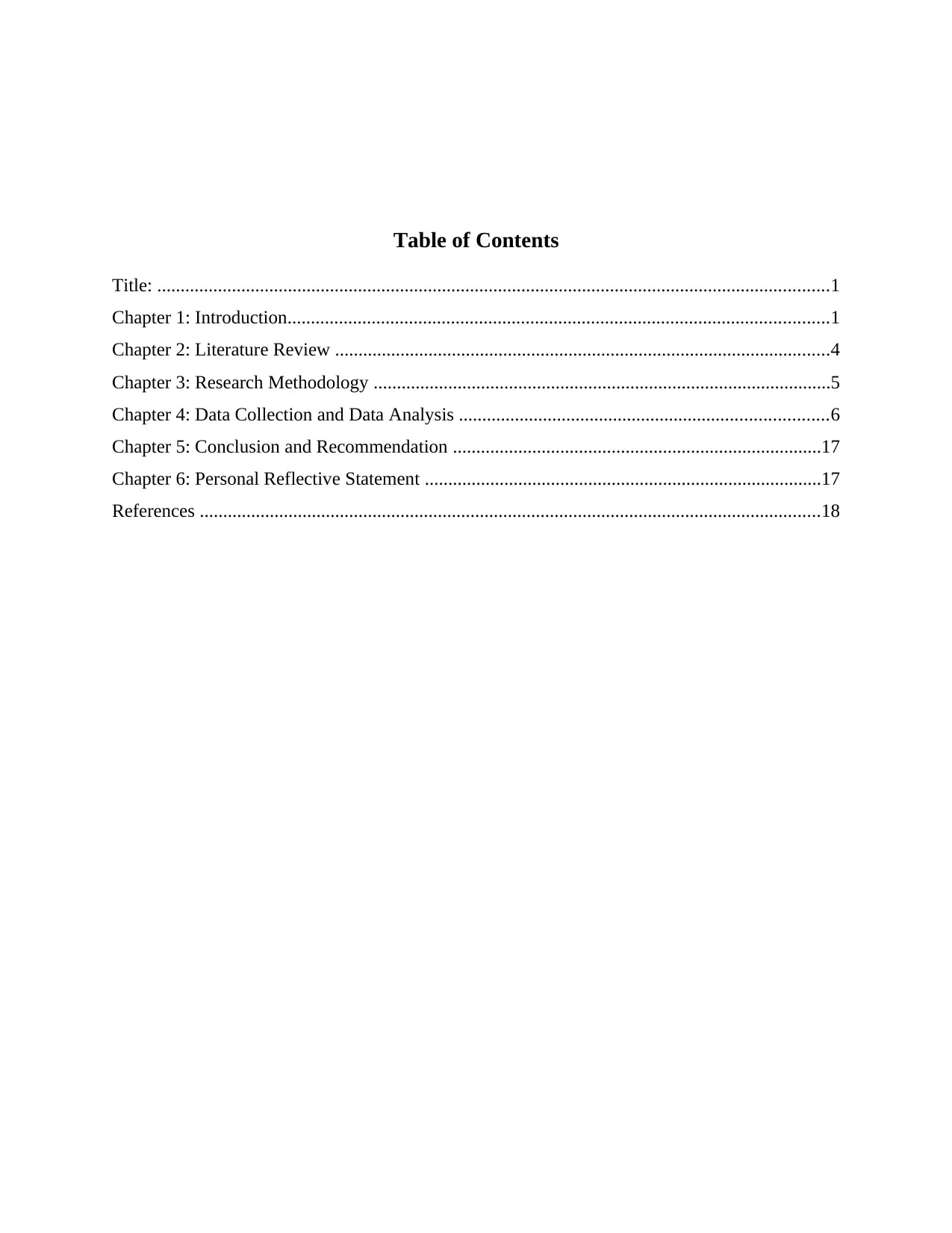
Table of Contents
Title: ................................................................................................................................................1
Chapter 1: Introduction....................................................................................................................1
Chapter 2: Literature Review ..........................................................................................................4
Chapter 3: Research Methodology ..................................................................................................5
Chapter 4: Data Collection and Data Analysis ...............................................................................6
Chapter 5: Conclusion and Recommendation ...............................................................................17
Chapter 6: Personal Reflective Statement .....................................................................................17
References .....................................................................................................................................18
Title: ................................................................................................................................................1
Chapter 1: Introduction....................................................................................................................1
Chapter 2: Literature Review ..........................................................................................................4
Chapter 3: Research Methodology ..................................................................................................5
Chapter 4: Data Collection and Data Analysis ...............................................................................6
Chapter 5: Conclusion and Recommendation ...............................................................................17
Chapter 6: Personal Reflective Statement .....................................................................................17
References .....................................................................................................................................18
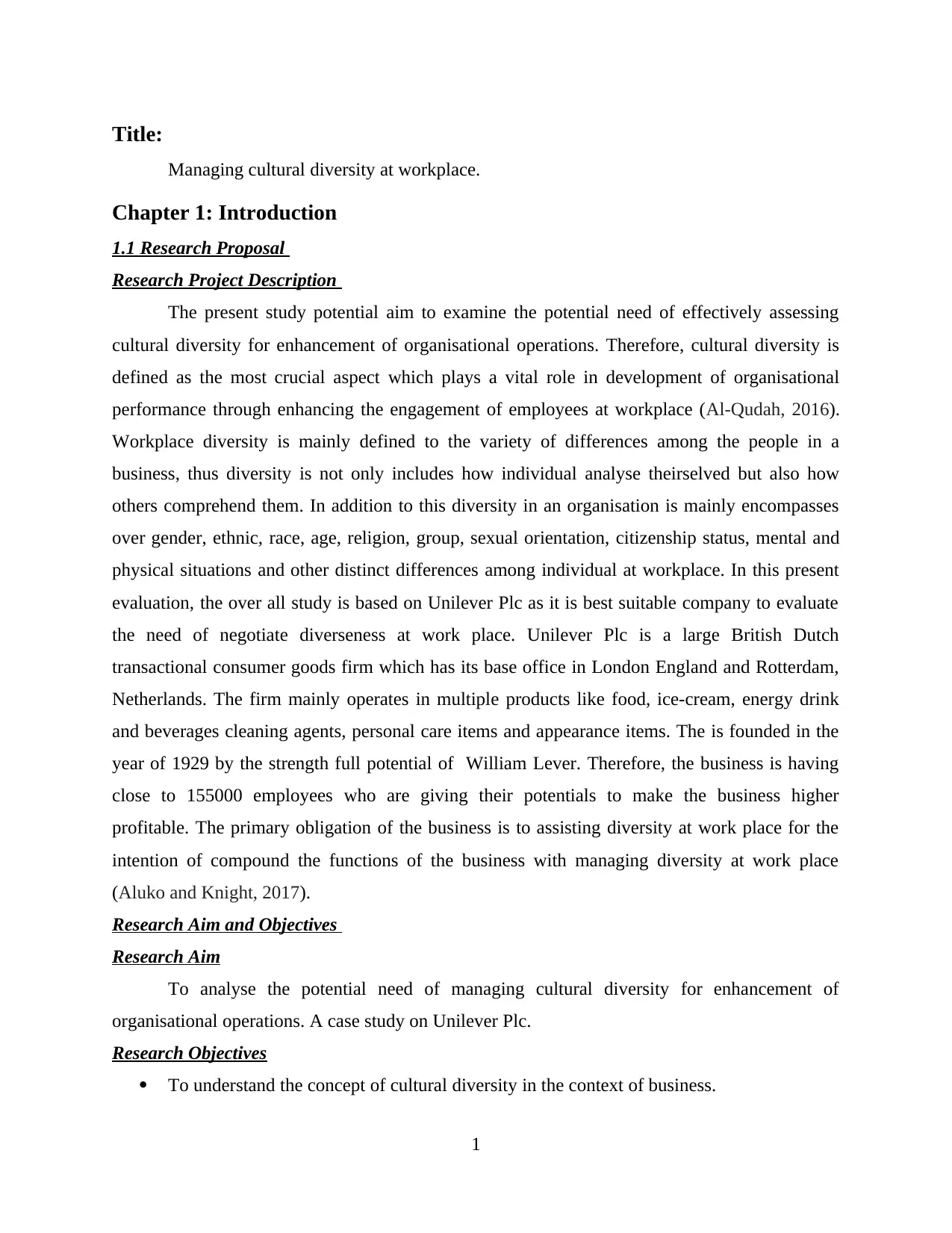
Title:
Managing cultural diversity at workplace.
Chapter 1: Introduction
1.1 Research Proposal
Research Project Description
The present study potential aim to examine the potential need of effectively assessing
cultural diversity for enhancement of organisational operations. Therefore, cultural diversity is
defined as the most crucial aspect which plays a vital role in development of organisational
performance through enhancing the engagement of employees at workplace (Al-Qudah, 2016).
Workplace diversity is mainly defined to the variety of differences among the people in a
business, thus diversity is not only includes how individual analyse theirselved but also how
others comprehend them. In addition to this diversity in an organisation is mainly encompasses
over gender, ethnic, race, age, religion, group, sexual orientation, citizenship status, mental and
physical situations and other distinct differences among individual at workplace. In this present
evaluation, the over all study is based on Unilever Plc as it is best suitable company to evaluate
the need of negotiate diverseness at work place. Unilever Plc is a large British Dutch
transactional consumer goods firm which has its base office in London England and Rotterdam,
Netherlands. The firm mainly operates in multiple products like food, ice-cream, energy drink
and beverages cleaning agents, personal care items and appearance items. The is founded in the
year of 1929 by the strength full potential of William Lever. Therefore, the business is having
close to 155000 employees who are giving their potentials to make the business higher
profitable. The primary obligation of the business is to assisting diversity at work place for the
intention of compound the functions of the business with managing diversity at work place
(Aluko and Knight, 2017).
Research Aim and Objectives
Research Aim
To analyse the potential need of managing cultural diversity for enhancement of
organisational operations. A case study on Unilever Plc.
Research Objectives
To understand the concept of cultural diversity in the context of business.
1
Managing cultural diversity at workplace.
Chapter 1: Introduction
1.1 Research Proposal
Research Project Description
The present study potential aim to examine the potential need of effectively assessing
cultural diversity for enhancement of organisational operations. Therefore, cultural diversity is
defined as the most crucial aspect which plays a vital role in development of organisational
performance through enhancing the engagement of employees at workplace (Al-Qudah, 2016).
Workplace diversity is mainly defined to the variety of differences among the people in a
business, thus diversity is not only includes how individual analyse theirselved but also how
others comprehend them. In addition to this diversity in an organisation is mainly encompasses
over gender, ethnic, race, age, religion, group, sexual orientation, citizenship status, mental and
physical situations and other distinct differences among individual at workplace. In this present
evaluation, the over all study is based on Unilever Plc as it is best suitable company to evaluate
the need of negotiate diverseness at work place. Unilever Plc is a large British Dutch
transactional consumer goods firm which has its base office in London England and Rotterdam,
Netherlands. The firm mainly operates in multiple products like food, ice-cream, energy drink
and beverages cleaning agents, personal care items and appearance items. The is founded in the
year of 1929 by the strength full potential of William Lever. Therefore, the business is having
close to 155000 employees who are giving their potentials to make the business higher
profitable. The primary obligation of the business is to assisting diversity at work place for the
intention of compound the functions of the business with managing diversity at work place
(Aluko and Knight, 2017).
Research Aim and Objectives
Research Aim
To analyse the potential need of managing cultural diversity for enhancement of
organisational operations. A case study on Unilever Plc.
Research Objectives
To understand the concept of cultural diversity in the context of business.
1
⊘ This is a preview!⊘
Do you want full access?
Subscribe today to unlock all pages.

Trusted by 1+ million students worldwide
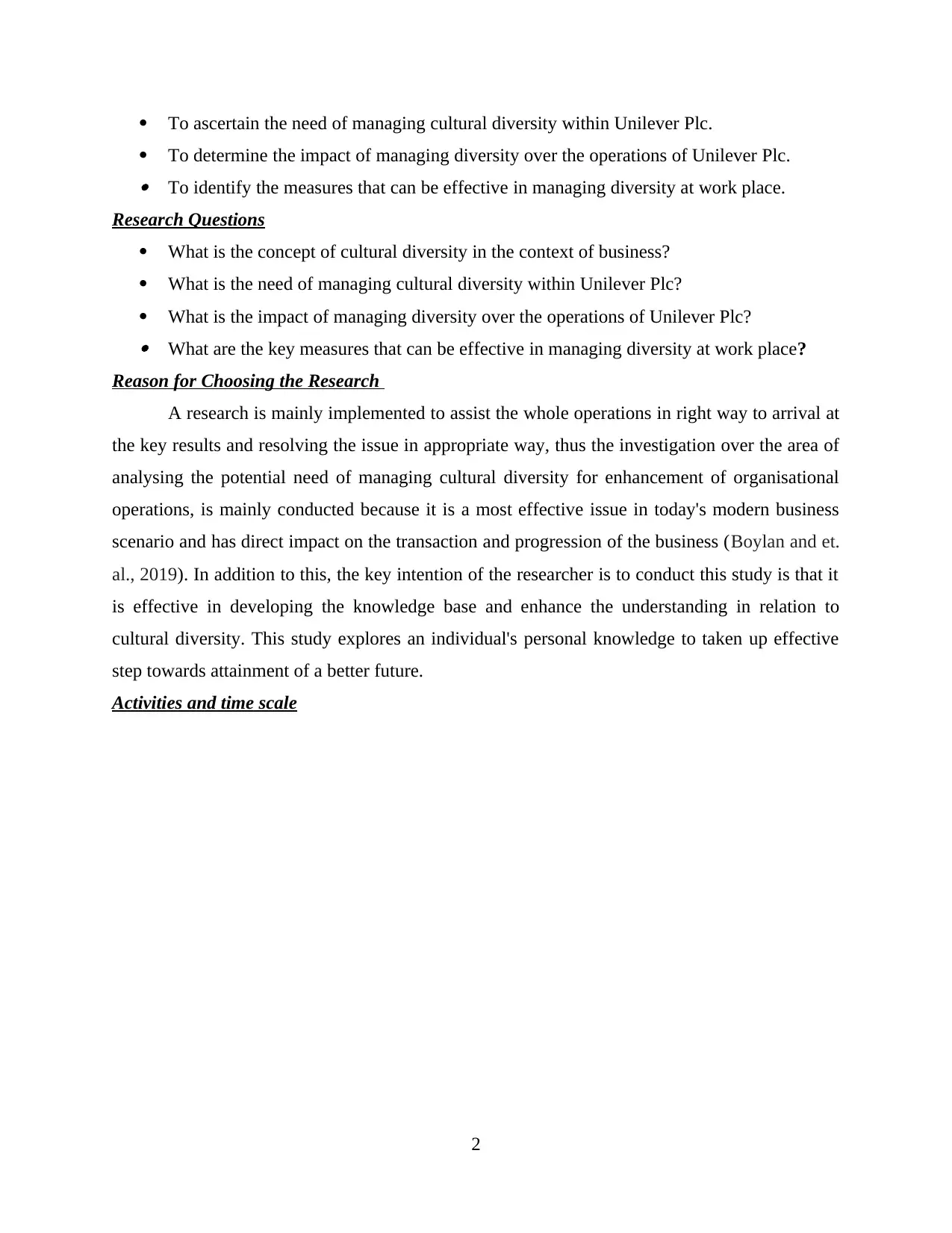
To ascertain the need of managing cultural diversity within Unilever Plc.
To determine the impact of managing diversity over the operations of Unilever Plc. To identify the measures that can be effective in managing diversity at work place.
Research Questions
What is the concept of cultural diversity in the context of business?
What is the need of managing cultural diversity within Unilever Plc?
What is the impact of managing diversity over the operations of Unilever Plc? What are the key measures that can be effective in managing diversity at work place?
Reason for Choosing the Research
A research is mainly implemented to assist the whole operations in right way to arrival at
the key results and resolving the issue in appropriate way, thus the investigation over the area of
analysing the potential need of managing cultural diversity for enhancement of organisational
operations, is mainly conducted because it is a most effective issue in today's modern business
scenario and has direct impact on the transaction and progression of the business (Boylan and et.
al., 2019). In addition to this, the key intention of the researcher is to conduct this study is that it
is effective in developing the knowledge base and enhance the understanding in relation to
cultural diversity. This study explores an individual's personal knowledge to taken up effective
step towards attainment of a better future.
Activities and time scale
2
To determine the impact of managing diversity over the operations of Unilever Plc. To identify the measures that can be effective in managing diversity at work place.
Research Questions
What is the concept of cultural diversity in the context of business?
What is the need of managing cultural diversity within Unilever Plc?
What is the impact of managing diversity over the operations of Unilever Plc? What are the key measures that can be effective in managing diversity at work place?
Reason for Choosing the Research
A research is mainly implemented to assist the whole operations in right way to arrival at
the key results and resolving the issue in appropriate way, thus the investigation over the area of
analysing the potential need of managing cultural diversity for enhancement of organisational
operations, is mainly conducted because it is a most effective issue in today's modern business
scenario and has direct impact on the transaction and progression of the business (Boylan and et.
al., 2019). In addition to this, the key intention of the researcher is to conduct this study is that it
is effective in developing the knowledge base and enhance the understanding in relation to
cultural diversity. This study explores an individual's personal knowledge to taken up effective
step towards attainment of a better future.
Activities and time scale
2
Paraphrase This Document
Need a fresh take? Get an instant paraphrase of this document with our AI Paraphraser

3
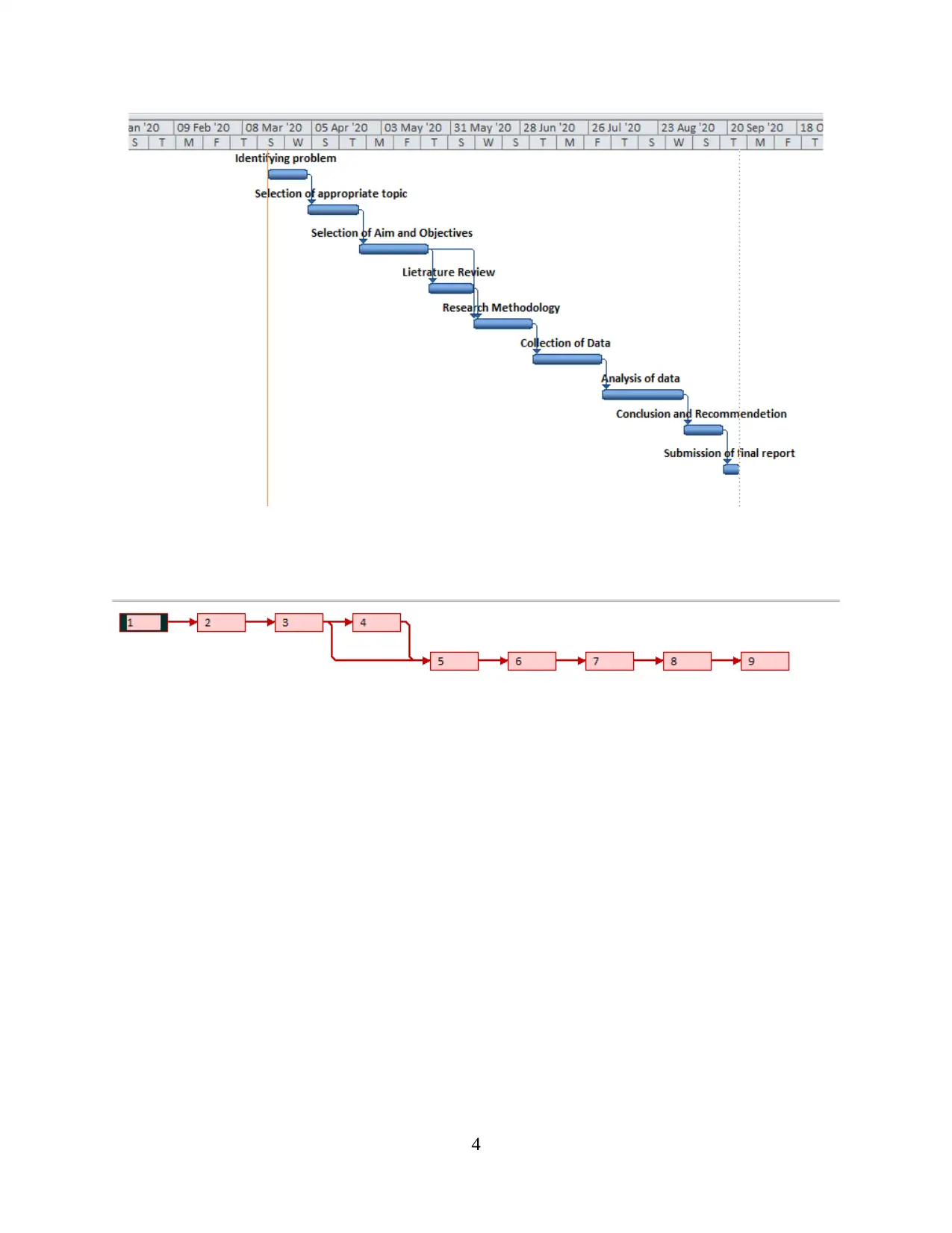
4
⊘ This is a preview!⊘
Do you want full access?
Subscribe today to unlock all pages.

Trusted by 1+ million students worldwide
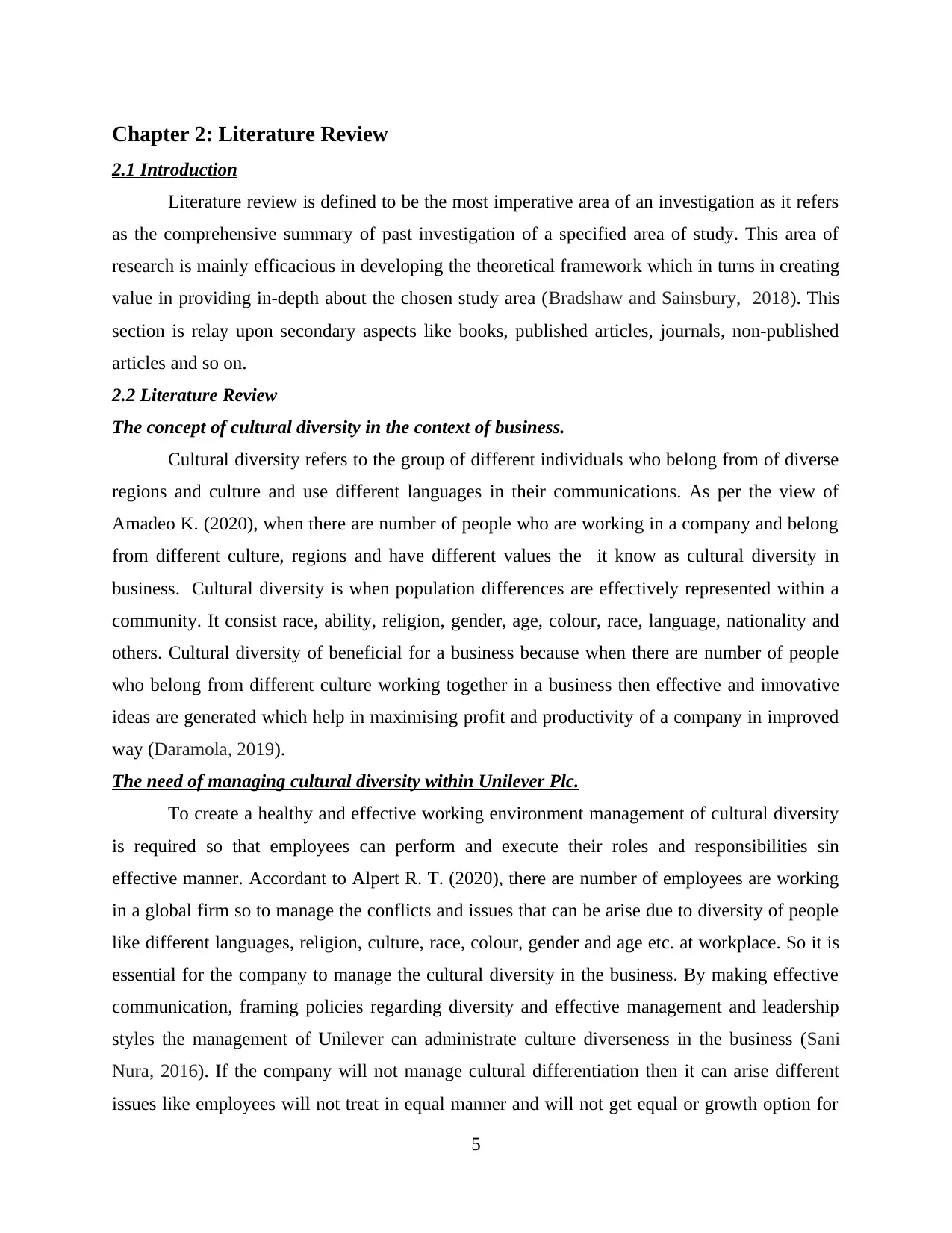
Chapter 2: Literature Review
2.1 Introduction
Literature review is defined to be the most imperative area of an investigation as it refers
as the comprehensive summary of past investigation of a specified area of study. This area of
research is mainly efficacious in developing the theoretical framework which in turns in creating
value in providing in-depth about the chosen study area (Bradshaw and Sainsbury, 2018). This
section is relay upon secondary aspects like books, published articles, journals, non-published
articles and so on.
2.2 Literature Review
The concept of cultural diversity in the context of business.
Cultural diversity refers to the group of different individuals who belong from of diverse
regions and culture and use different languages in their communications. As per the view of
Amadeo K. (2020), when there are number of people who are working in a company and belong
from different culture, regions and have different values the it know as cultural diversity in
business. Cultural diversity is when population differences are effectively represented within a
community. It consist race, ability, religion, gender, age, colour, race, language, nationality and
others. Cultural diversity of beneficial for a business because when there are number of people
who belong from different culture working together in a business then effective and innovative
ideas are generated which help in maximising profit and productivity of a company in improved
way (Daramola, 2019).
The need of managing cultural diversity within Unilever Plc.
To create a healthy and effective working environment management of cultural diversity
is required so that employees can perform and execute their roles and responsibilities sin
effective manner. Accordant to Alpert R. T. (2020), there are number of employees are working
in a global firm so to manage the conflicts and issues that can be arise due to diversity of people
like different languages, religion, culture, race, colour, gender and age etc. at workplace. So it is
essential for the company to manage the cultural diversity in the business. By making effective
communication, framing policies regarding diversity and effective management and leadership
styles the management of Unilever can administrate culture diverseness in the business (Sani
Nura, 2016). If the company will not manage cultural differentiation then it can arise different
issues like employees will not treat in equal manner and will not get equal or growth option for
5
2.1 Introduction
Literature review is defined to be the most imperative area of an investigation as it refers
as the comprehensive summary of past investigation of a specified area of study. This area of
research is mainly efficacious in developing the theoretical framework which in turns in creating
value in providing in-depth about the chosen study area (Bradshaw and Sainsbury, 2018). This
section is relay upon secondary aspects like books, published articles, journals, non-published
articles and so on.
2.2 Literature Review
The concept of cultural diversity in the context of business.
Cultural diversity refers to the group of different individuals who belong from of diverse
regions and culture and use different languages in their communications. As per the view of
Amadeo K. (2020), when there are number of people who are working in a company and belong
from different culture, regions and have different values the it know as cultural diversity in
business. Cultural diversity is when population differences are effectively represented within a
community. It consist race, ability, religion, gender, age, colour, race, language, nationality and
others. Cultural diversity of beneficial for a business because when there are number of people
who belong from different culture working together in a business then effective and innovative
ideas are generated which help in maximising profit and productivity of a company in improved
way (Daramola, 2019).
The need of managing cultural diversity within Unilever Plc.
To create a healthy and effective working environment management of cultural diversity
is required so that employees can perform and execute their roles and responsibilities sin
effective manner. Accordant to Alpert R. T. (2020), there are number of employees are working
in a global firm so to manage the conflicts and issues that can be arise due to diversity of people
like different languages, religion, culture, race, colour, gender and age etc. at workplace. So it is
essential for the company to manage the cultural diversity in the business. By making effective
communication, framing policies regarding diversity and effective management and leadership
styles the management of Unilever can administrate culture diverseness in the business (Sani
Nura, 2016). If the company will not manage cultural differentiation then it can arise different
issues like employees will not treat in equal manner and will not get equal or growth option for
5
Paraphrase This Document
Need a fresh take? Get an instant paraphrase of this document with our AI Paraphraser
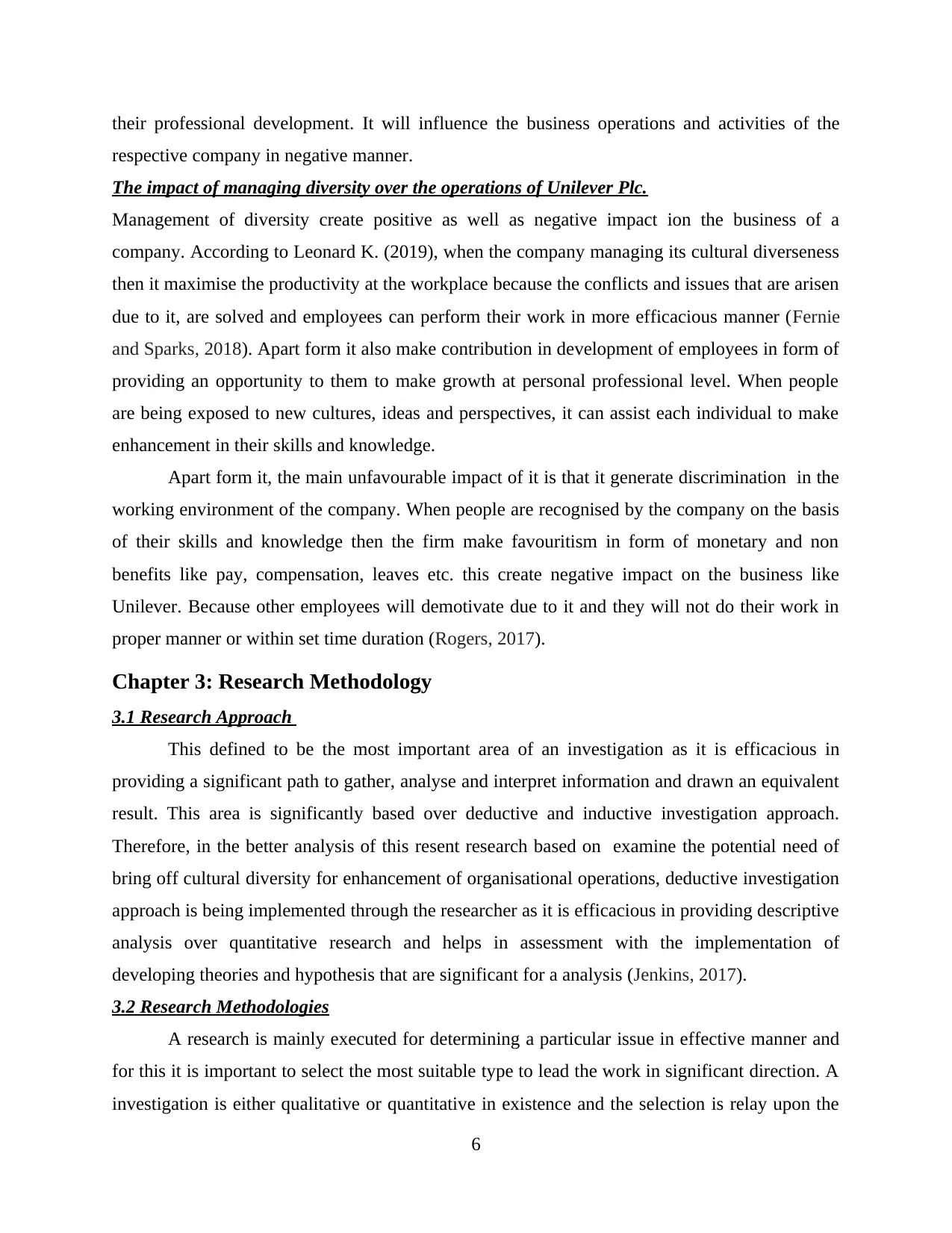
their professional development. It will influence the business operations and activities of the
respective company in negative manner.
The impact of managing diversity over the operations of Unilever Plc.
Management of diversity create positive as well as negative impact ion the business of a
company. According to Leonard K. (2019), when the company managing its cultural diverseness
then it maximise the productivity at the workplace because the conflicts and issues that are arisen
due to it, are solved and employees can perform their work in more efficacious manner (Fernie
and Sparks, 2018). Apart form it also make contribution in development of employees in form of
providing an opportunity to them to make growth at personal professional level. When people
are being exposed to new cultures, ideas and perspectives, it can assist each individual to make
enhancement in their skills and knowledge.
Apart form it, the main unfavourable impact of it is that it generate discrimination in the
working environment of the company. When people are recognised by the company on the basis
of their skills and knowledge then the firm make favouritism in form of monetary and non
benefits like pay, compensation, leaves etc. this create negative impact on the business like
Unilever. Because other employees will demotivate due to it and they will not do their work in
proper manner or within set time duration (Rogers, 2017).
Chapter 3: Research Methodology
3.1 Research Approach
This defined to be the most important area of an investigation as it is efficacious in
providing a significant path to gather, analyse and interpret information and drawn an equivalent
result. This area is significantly based over deductive and inductive investigation approach.
Therefore, in the better analysis of this resent research based on examine the potential need of
bring off cultural diversity for enhancement of organisational operations, deductive investigation
approach is being implemented through the researcher as it is efficacious in providing descriptive
analysis over quantitative research and helps in assessment with the implementation of
developing theories and hypothesis that are significant for a analysis (Jenkins, 2017).
3.2 Research Methodologies
A research is mainly executed for determining a particular issue in effective manner and
for this it is important to select the most suitable type to lead the work in significant direction. A
investigation is either qualitative or quantitative in existence and the selection is relay upon the
6
respective company in negative manner.
The impact of managing diversity over the operations of Unilever Plc.
Management of diversity create positive as well as negative impact ion the business of a
company. According to Leonard K. (2019), when the company managing its cultural diverseness
then it maximise the productivity at the workplace because the conflicts and issues that are arisen
due to it, are solved and employees can perform their work in more efficacious manner (Fernie
and Sparks, 2018). Apart form it also make contribution in development of employees in form of
providing an opportunity to them to make growth at personal professional level. When people
are being exposed to new cultures, ideas and perspectives, it can assist each individual to make
enhancement in their skills and knowledge.
Apart form it, the main unfavourable impact of it is that it generate discrimination in the
working environment of the company. When people are recognised by the company on the basis
of their skills and knowledge then the firm make favouritism in form of monetary and non
benefits like pay, compensation, leaves etc. this create negative impact on the business like
Unilever. Because other employees will demotivate due to it and they will not do their work in
proper manner or within set time duration (Rogers, 2017).
Chapter 3: Research Methodology
3.1 Research Approach
This defined to be the most important area of an investigation as it is efficacious in
providing a significant path to gather, analyse and interpret information and drawn an equivalent
result. This area is significantly based over deductive and inductive investigation approach.
Therefore, in the better analysis of this resent research based on examine the potential need of
bring off cultural diversity for enhancement of organisational operations, deductive investigation
approach is being implemented through the researcher as it is efficacious in providing descriptive
analysis over quantitative research and helps in assessment with the implementation of
developing theories and hypothesis that are significant for a analysis (Jenkins, 2017).
3.2 Research Methodologies
A research is mainly executed for determining a particular issue in effective manner and
for this it is important to select the most suitable type to lead the work in significant direction. A
investigation is either qualitative or quantitative in existence and the selection is relay upon the
6
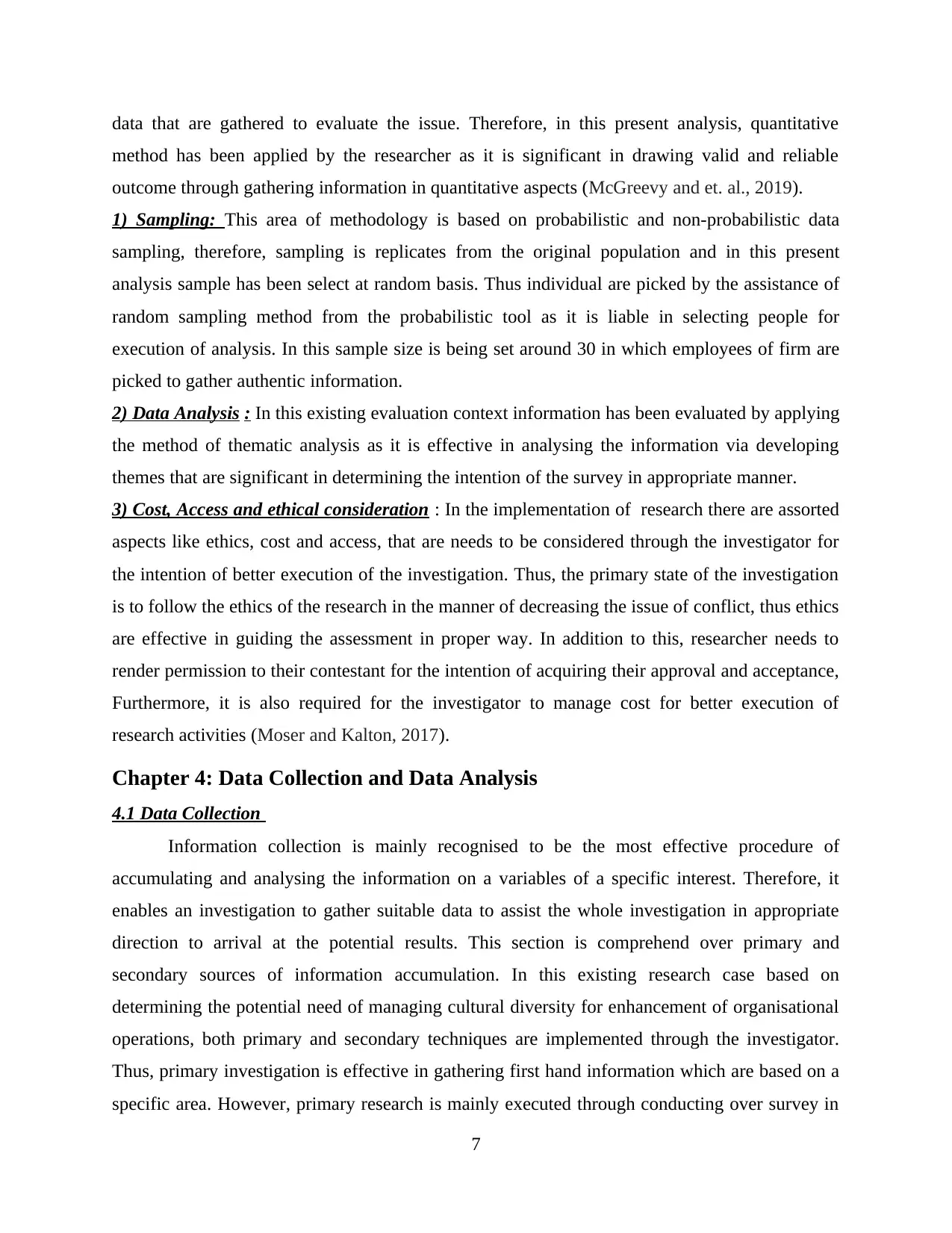
data that are gathered to evaluate the issue. Therefore, in this present analysis, quantitative
method has been applied by the researcher as it is significant in drawing valid and reliable
outcome through gathering information in quantitative aspects (McGreevy and et. al., 2019).
1) Sampling: This area of methodology is based on probabilistic and non-probabilistic data
sampling, therefore, sampling is replicates from the original population and in this present
analysis sample has been select at random basis. Thus individual are picked by the assistance of
random sampling method from the probabilistic tool as it is liable in selecting people for
execution of analysis. In this sample size is being set around 30 in which employees of firm are
picked to gather authentic information.
2) Data Analysis : In this existing evaluation context information has been evaluated by applying
the method of thematic analysis as it is effective in analysing the information via developing
themes that are significant in determining the intention of the survey in appropriate manner.
3) Cost, Access and ethical consideration : In the implementation of research there are assorted
aspects like ethics, cost and access, that are needs to be considered through the investigator for
the intention of better execution of the investigation. Thus, the primary state of the investigation
is to follow the ethics of the research in the manner of decreasing the issue of conflict, thus ethics
are effective in guiding the assessment in proper way. In addition to this, researcher needs to
render permission to their contestant for the intention of acquiring their approval and acceptance,
Furthermore, it is also required for the investigator to manage cost for better execution of
research activities (Moser and Kalton, 2017).
Chapter 4: Data Collection and Data Analysis
4.1 Data Collection
Information collection is mainly recognised to be the most effective procedure of
accumulating and analysing the information on a variables of a specific interest. Therefore, it
enables an investigation to gather suitable data to assist the whole investigation in appropriate
direction to arrival at the potential results. This section is comprehend over primary and
secondary sources of information accumulation. In this existing research case based on
determining the potential need of managing cultural diversity for enhancement of organisational
operations, both primary and secondary techniques are implemented through the investigator.
Thus, primary investigation is effective in gathering first hand information which are based on a
specific area. However, primary research is mainly executed through conducting over survey in
7
method has been applied by the researcher as it is significant in drawing valid and reliable
outcome through gathering information in quantitative aspects (McGreevy and et. al., 2019).
1) Sampling: This area of methodology is based on probabilistic and non-probabilistic data
sampling, therefore, sampling is replicates from the original population and in this present
analysis sample has been select at random basis. Thus individual are picked by the assistance of
random sampling method from the probabilistic tool as it is liable in selecting people for
execution of analysis. In this sample size is being set around 30 in which employees of firm are
picked to gather authentic information.
2) Data Analysis : In this existing evaluation context information has been evaluated by applying
the method of thematic analysis as it is effective in analysing the information via developing
themes that are significant in determining the intention of the survey in appropriate manner.
3) Cost, Access and ethical consideration : In the implementation of research there are assorted
aspects like ethics, cost and access, that are needs to be considered through the investigator for
the intention of better execution of the investigation. Thus, the primary state of the investigation
is to follow the ethics of the research in the manner of decreasing the issue of conflict, thus ethics
are effective in guiding the assessment in proper way. In addition to this, researcher needs to
render permission to their contestant for the intention of acquiring their approval and acceptance,
Furthermore, it is also required for the investigator to manage cost for better execution of
research activities (Moser and Kalton, 2017).
Chapter 4: Data Collection and Data Analysis
4.1 Data Collection
Information collection is mainly recognised to be the most effective procedure of
accumulating and analysing the information on a variables of a specific interest. Therefore, it
enables an investigation to gather suitable data to assist the whole investigation in appropriate
direction to arrival at the potential results. This section is comprehend over primary and
secondary sources of information accumulation. In this existing research case based on
determining the potential need of managing cultural diversity for enhancement of organisational
operations, both primary and secondary techniques are implemented through the investigator.
Thus, primary investigation is effective in gathering first hand information which are based on a
specific area. However, primary research is mainly executed through conducting over survey in
7
⊘ This is a preview!⊘
Do you want full access?
Subscribe today to unlock all pages.

Trusted by 1+ million students worldwide
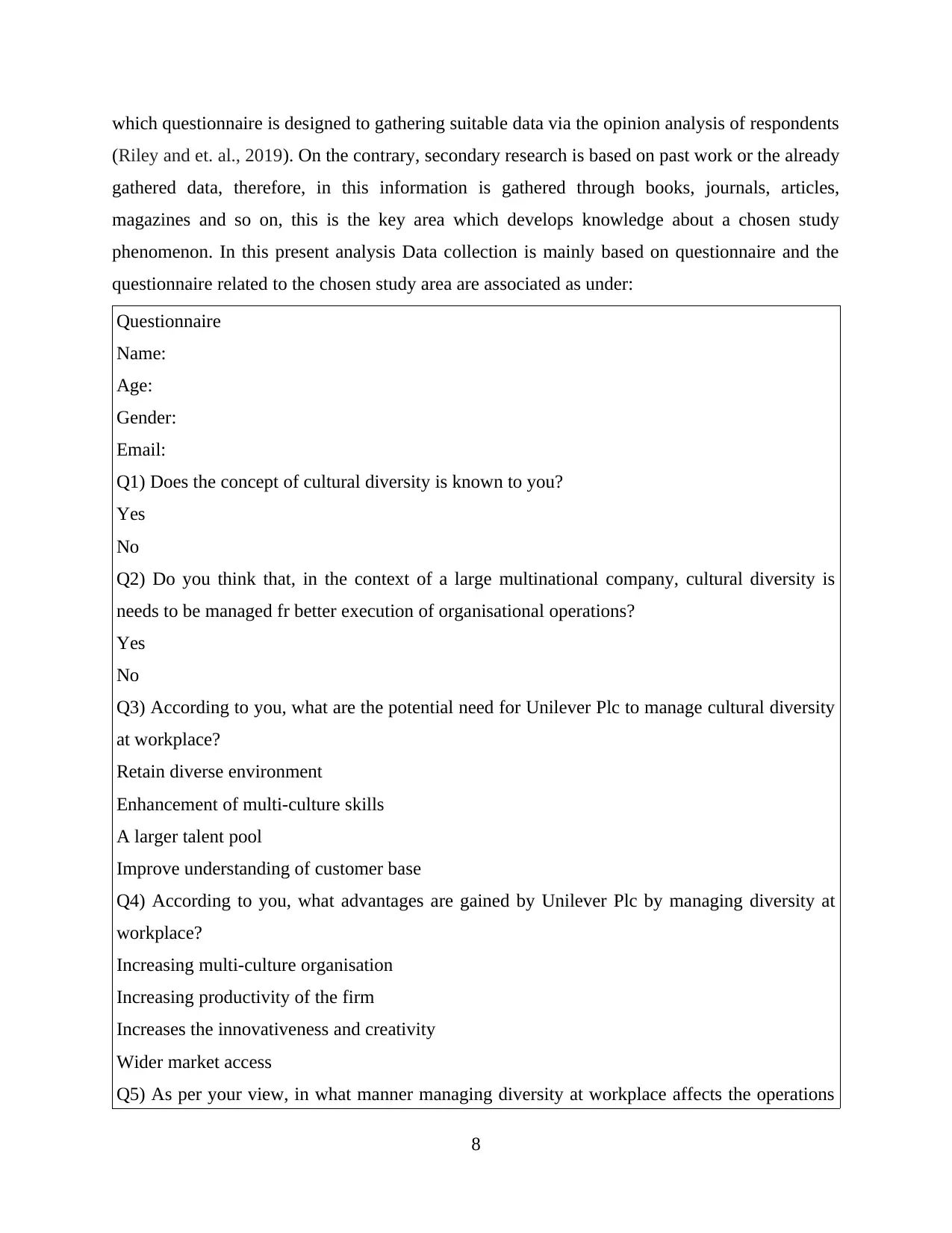
which questionnaire is designed to gathering suitable data via the opinion analysis of respondents
(Riley and et. al., 2019). On the contrary, secondary research is based on past work or the already
gathered data, therefore, in this information is gathered through books, journals, articles,
magazines and so on, this is the key area which develops knowledge about a chosen study
phenomenon. In this present analysis Data collection is mainly based on questionnaire and the
questionnaire related to the chosen study area are associated as under:
Questionnaire
Name:
Age:
Gender:
Email:
Q1) Does the concept of cultural diversity is known to you?
Yes
No
Q2) Do you think that, in the context of a large multinational company, cultural diversity is
needs to be managed fr better execution of organisational operations?
Yes
No
Q3) According to you, what are the potential need for Unilever Plc to manage cultural diversity
at workplace?
Retain diverse environment
Enhancement of multi-culture skills
A larger talent pool
Improve understanding of customer base
Q4) According to you, what advantages are gained by Unilever Plc by managing diversity at
workplace?
Increasing multi-culture organisation
Increasing productivity of the firm
Increases the innovativeness and creativity
Wider market access
Q5) As per your view, in what manner managing diversity at workplace affects the operations
8
(Riley and et. al., 2019). On the contrary, secondary research is based on past work or the already
gathered data, therefore, in this information is gathered through books, journals, articles,
magazines and so on, this is the key area which develops knowledge about a chosen study
phenomenon. In this present analysis Data collection is mainly based on questionnaire and the
questionnaire related to the chosen study area are associated as under:
Questionnaire
Name:
Age:
Gender:
Email:
Q1) Does the concept of cultural diversity is known to you?
Yes
No
Q2) Do you think that, in the context of a large multinational company, cultural diversity is
needs to be managed fr better execution of organisational operations?
Yes
No
Q3) According to you, what are the potential need for Unilever Plc to manage cultural diversity
at workplace?
Retain diverse environment
Enhancement of multi-culture skills
A larger talent pool
Improve understanding of customer base
Q4) According to you, what advantages are gained by Unilever Plc by managing diversity at
workplace?
Increasing multi-culture organisation
Increasing productivity of the firm
Increases the innovativeness and creativity
Wider market access
Q5) As per your view, in what manner managing diversity at workplace affects the operations
8
Paraphrase This Document
Need a fresh take? Get an instant paraphrase of this document with our AI Paraphraser
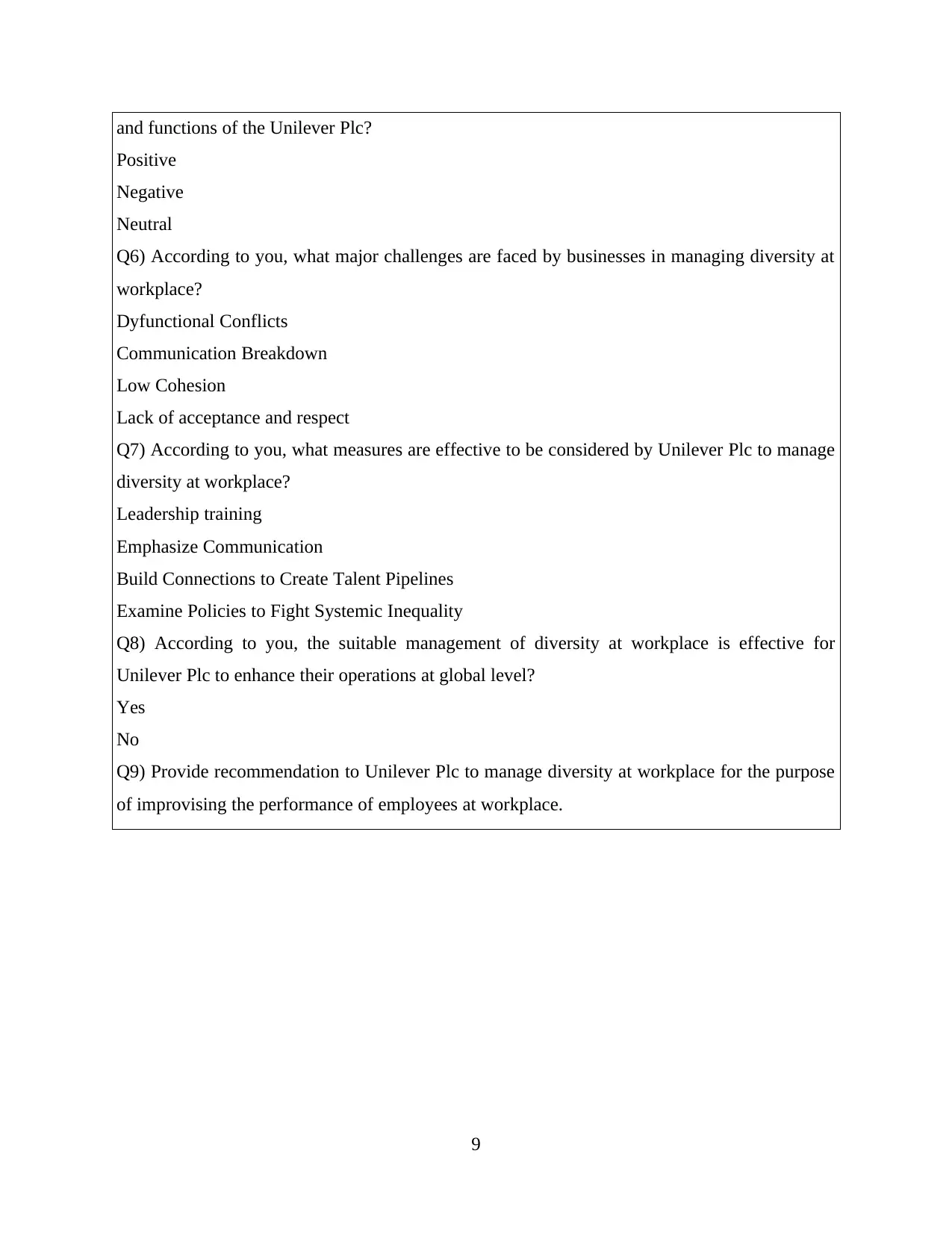
and functions of the Unilever Plc?
Positive
Negative
Neutral
Q6) According to you, what major challenges are faced by businesses in managing diversity at
workplace?
Dyfunctional Conflicts
Communication Breakdown
Low Cohesion
Lack of acceptance and respect
Q7) According to you, what measures are effective to be considered by Unilever Plc to manage
diversity at workplace?
Leadership training
Emphasize Communication
Build Connections to Create Talent Pipelines
Examine Policies to Fight Systemic Inequality
Q8) According to you, the suitable management of diversity at workplace is effective for
Unilever Plc to enhance their operations at global level?
Yes
No
Q9) Provide recommendation to Unilever Plc to manage diversity at workplace for the purpose
of improvising the performance of employees at workplace.
9
Positive
Negative
Neutral
Q6) According to you, what major challenges are faced by businesses in managing diversity at
workplace?
Dyfunctional Conflicts
Communication Breakdown
Low Cohesion
Lack of acceptance and respect
Q7) According to you, what measures are effective to be considered by Unilever Plc to manage
diversity at workplace?
Leadership training
Emphasize Communication
Build Connections to Create Talent Pipelines
Examine Policies to Fight Systemic Inequality
Q8) According to you, the suitable management of diversity at workplace is effective for
Unilever Plc to enhance their operations at global level?
Yes
No
Q9) Provide recommendation to Unilever Plc to manage diversity at workplace for the purpose
of improvising the performance of employees at workplace.
9
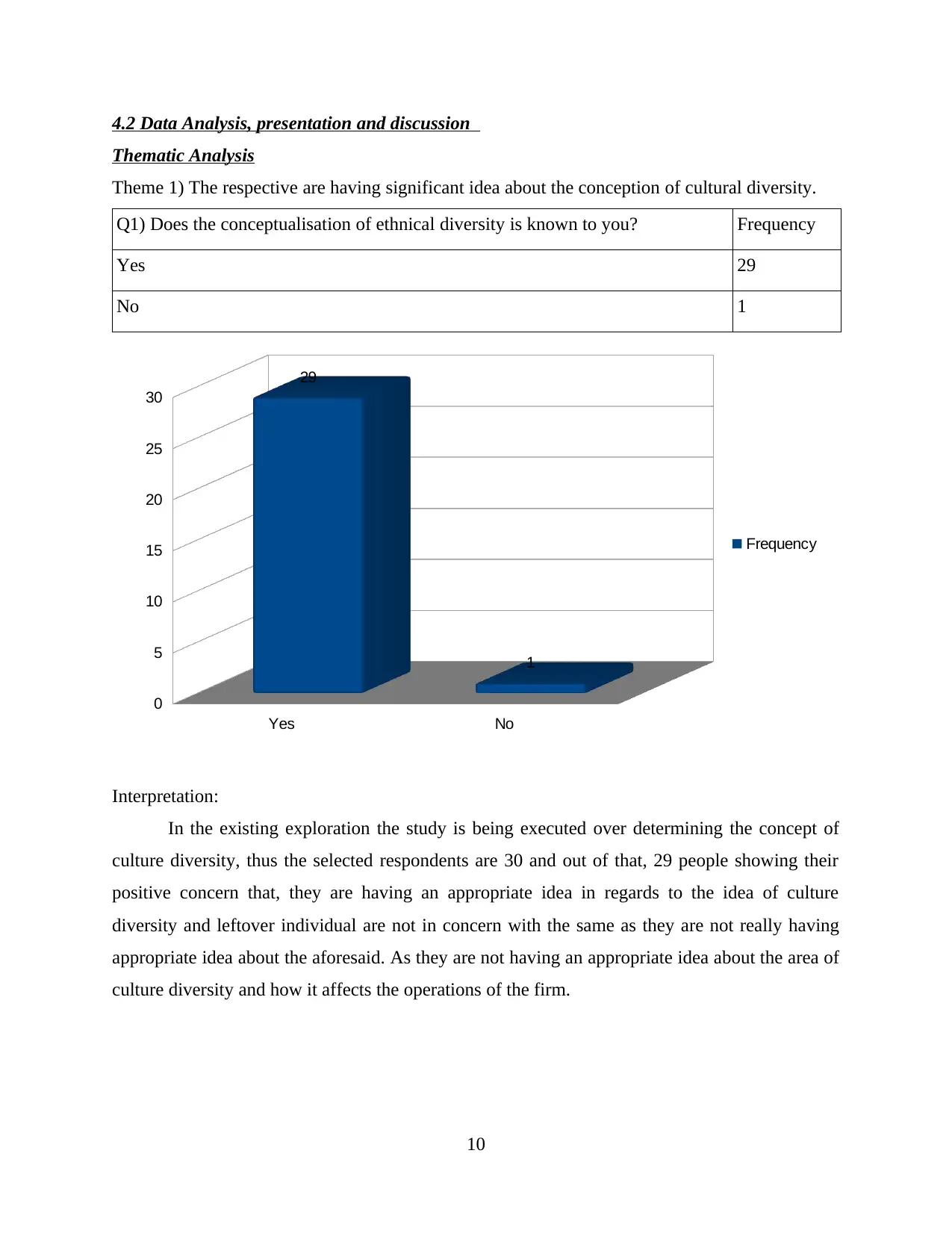
4.2 Data Analysis, presentation and discussion
Thematic Analysis
Theme 1) The respective are having significant idea about the conception of cultural diversity.
Q1) Does the conceptualisation of ethnical diversity is known to you? Frequency
Yes 29
No 1
Interpretation:
In the existing exploration the study is being executed over determining the concept of
culture diversity, thus the selected respondents are 30 and out of that, 29 people showing their
positive concern that, they are having an appropriate idea in regards to the idea of culture
diversity and leftover individual are not in concern with the same as they are not really having
appropriate idea about the aforesaid. As they are not having an appropriate idea about the area of
culture diversity and how it affects the operations of the firm.
10
Yes No
0
5
10
15
20
25
30
29
1
Frequency
Thematic Analysis
Theme 1) The respective are having significant idea about the conception of cultural diversity.
Q1) Does the conceptualisation of ethnical diversity is known to you? Frequency
Yes 29
No 1
Interpretation:
In the existing exploration the study is being executed over determining the concept of
culture diversity, thus the selected respondents are 30 and out of that, 29 people showing their
positive concern that, they are having an appropriate idea in regards to the idea of culture
diversity and leftover individual are not in concern with the same as they are not really having
appropriate idea about the aforesaid. As they are not having an appropriate idea about the area of
culture diversity and how it affects the operations of the firm.
10
Yes No
0
5
10
15
20
25
30
29
1
Frequency
⊘ This is a preview!⊘
Do you want full access?
Subscribe today to unlock all pages.

Trusted by 1+ million students worldwide
1 out of 23
Related Documents
Your All-in-One AI-Powered Toolkit for Academic Success.
+13062052269
info@desklib.com
Available 24*7 on WhatsApp / Email
![[object Object]](/_next/static/media/star-bottom.7253800d.svg)
Unlock your academic potential
Copyright © 2020–2026 A2Z Services. All Rights Reserved. Developed and managed by ZUCOL.





